John Quigley: I spend most of
my time on the phone, like right now, or on the walkie-talkie,
or calling down to people below and them calling back up to
me. Rarely is there nothing going on. Most of the time it's
an 18-hour day.
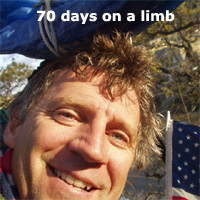 Physically
the biggest challenge is the lack of aerobic exercise. I go
up and down the rope part of the way in the tree. That gives
me a little bit of exercise but it's not like playing basketball.
The atrophy factor is definitely the biggest challenge. Physically
the biggest challenge is the lack of aerobic exercise. I go
up and down the rope part of the way in the tree. That gives
me a little bit of exercise but it's not like playing basketball.
The atrophy factor is definitely the biggest challenge.
I sleep up here. It's hard to believe this is Day 41 (Quigley
began his sit-in on November 1st, 2002). I never imagined
it would go this long. There was one wet winter storm, then
we had the wind storm, which was the most intense period.
The winds are the toughest thing.
(More rains followed during Quigley's vigil, and an intense
winter storm occurred after Christmas, followed by a furious
Santa Ana windstorm in January that caused widespread damages
and power outages in the L.A. area.)
Five-O: How did you find your
tree?
John: A friend sent me an
email. Some folks from around here contacted her and told
her they were going to cut this 400 year-old oak tree. She
knew I  had
a background in forest protection so I got this email
it was an emergency situation and I just decided to respond
to it. The people up here who were asking for help sent me
an email photograph of the tree and explained the situation,
that it was being cut to widen the road. In this case, email
played a big part. had
a background in forest protection so I got this email
it was an emergency situation and I just decided to respond
to it. The people up here who were asking for help sent me
an email photograph of the tree and explained the situation,
that it was being cut to widen the road. In this case, email
played a big part.
It's been such a roller coaster ride. We've been through
the police drama. I mean, in the early days it was just me
up here and no one around. So late at night you'd have people
coming by I had a gunshot the second night right in
front of the tree. It's a very vulnerable feeling.
Once the police drama started then there was all this media
attention.  The
sheriff came one morning and said they'd been dispatched because
the tree was going to be cut that morning. A bunch of folks
stood under the tree and the sheriff said they were subject
to arrest if they didn't leave. The
sheriff came one morning and said they'd been dispatched because
the tree was going to be cut that morning. A bunch of folks
stood under the tree and the sheriff said they were subject
to arrest if they didn't leave.
Workers came and built a fence around the tree. They backed
off that day. The next day they came and blocked off the street
and now the fire department was here. It looked like they
were going to try to drag me out of the tree but there were
all these kids across the street shouting "Save Old Glory."
The fire department guys shook  their
heads and said, "We don't want any part of this,"
so they left. Then the sheriff stood down, and from that point
on things have been moving in our direction, which means reaching
a solution that saves this tree. their
heads and said, "We don't want any part of this,"
so they left. Then the sheriff stood down, and from that point
on things have been moving in our direction, which means reaching
a solution that saves this tree.
L.A. County Supervisor Mike Antonovich was originally saying
Old Glory had to be cut. That's when they were going to arrest
me. He stuck with that for several days. Then with a lot of
 public
pressure he said that he was going to move the tree. We think
that moving it would kill the tree and most experts agree. public
pressure he said that he was going to move the tree. We think
that moving it would kill the tree and most experts agree.
Five-O: Is there any prior
example of successfully transplanting a 400 year-old tree?
John: Not that I know of.
Certainly the company that was going to move the tree never
had that kind of experience. The root ball of this tree is
so massive it's a bad idea.
The police drama happened the end of the second week, about
the 14th or 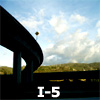 15th
of November. Once the story changed and they said they were
moving the tree, our whole situation became consulting with experts
in the community, and communicating
to the public that moving the tree would be the same as killing
the tree. It would be an expensive sideshow. We won that battle
in the public mind. Then I had Thanksgiving in the tree. We
had a big celebration out here. 15th
of November. Once the story changed and they said they were
moving the tree, our whole situation became consulting with experts
in the community, and communicating
to the public that moving the tree would be the same as killing
the tree. It would be an expensive sideshow. We won that battle
in the public mind. Then I had Thanksgiving in the tree. We
had a big celebration out here.
Then it looked like they were going to come out here and
cut the roots to move it December 2nd. We called it D-Day
for Old Glory. That's  when
everything changed, because we created such a big presence
out here that very quickly negotiations began. when
everything changed, because we created such a big presence
out here that very quickly negotiations began.
The first rain was in early November. The windstorm came
just before Thanksgiving and that was really intense
dry, 60 mile-per-hour Santa Ana winds. I definitely said some
prayers.
Five-O: Does the tree have
a 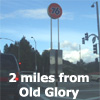 character
you can describe? character
you can describe?
John: The way I describe it
is a quiet respect. Everyday my relationship with it grows
stronger. There are subtle things that you notice day by day.
Now there's all kind of new life up here green leaves
popping out. The drink of water it got from that storm is now
reaching the crown of tree. It's nice to see a lot of new life.
Five-O: How high up are you?
John: 46 feet.
Five-O: How's the view?
John: I have a view of this
canyon, Pico Canyon. I can see the  development
across the street, the line of new homes on the ridge, and
up ahead I see the natural canyon as it used to be. development
across the street, the line of new homes on the ridge, and
up ahead I see the natural canyon as it used to be.
Five-O: What methods have
you used previously as an environmentalist?
John: It depends. I'm an environmental
educator. There's different ways you can make things happen.
I have been involved a few times in things where you take
a real strong stand. I did a tree sit up in British Columbia
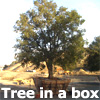 back
in '95. That's where I learned some of these techniques. I've
been involved in various issues, rainforest issues. I also
produce events, educational events for kids and stuff like
that. back
in '95. That's where I learned some of these techniques. I've
been involved in various issues, rainforest issues. I also
produce events, educational events for kids and stuff like
that.
I was born in Minnesota, raised outside Washington D.C. I
went to school at San Diego State I have a drama degree.
My environmental awakening came when I moved to Los 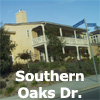 Angeles
and saw the density and pollution and thought, wow, is this
where everything is headed? That was 1989. Angeles
and saw the density and pollution and thought, wow, is this
where everything is headed? That was 1989.
Five-O: What's happened since
D-Day?
John: We're working on an
alternative plan so the tree can stay here and the road can
go around. There's a lot of engineering involved in that.
There's been surveyors out and we've had engineers here
a lot of technical stuff.
Five-O: Can they make the
oak the median?
John: That's one thing we're
talking about.
Five-O: Do you anticipate
being in 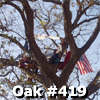 the
tree for Christmas and New Year's? the
tree for Christmas and New Year's?
John: I don't know. A lot
of people here want to come up and do some time in the protector's
perch here. So we're having these discussions now. There are
several qualified people who could come up and replace me.
I need to go back East and see my dad, who's been gravely
ill. I was supposed to see him over Thanksgiving and I wasn't
able to do that. We definitely are prepared over the long
term to have a
presence here, whether it's me personally all the time or
whether it's a rotation.
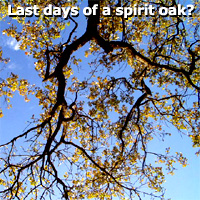
Five-O: Do you have relations
with the development company by now?
John: Let's just say we're
in discussions. It's delicate so I can't 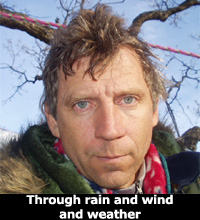 say
too much. I never imagined it would go this long. I just didn't
think it would be that difficult to save a 400 year-old oak
tree it's the oldest in this whole area right here. say
too much. I never imagined it would go this long. I just didn't
think it would be that difficult to save a 400 year-old oak
tree it's the oldest in this whole area right here.
Five-O: How did Old Glory
get its name?
John: A couple of local kids,
Taylor and Blake Borland, ages 13 and 10, wrote a letter to
Mr. Antonovich and the rest of the supervisors that talked
about how growing up they've seen all the big oak trees cut
around  here
and the only one left is the one they called Old Glory. They
named it that because it stands here in all its glory and
majesty representing all the trees that have already been
cut down. here
and the only one left is the one they called Old Glory. They
named it that because it stands here in all its glory and
majesty representing all the trees that have already been
cut down.
After I read that letter, I said, you know what, I think
we have a name for the tree. I called the parents and the
kids and said "Do you mind if I share  this
letter with the public?" They said they didn't mind,
and that's where Old Glory got its name. this
letter with the public?" They said they didn't mind,
and that's where Old Glory got its name.
We need people to contact Mike Antonovich and tell him they
want the tree to stay right where it's been for 400 years.
Let's tell him he can be the hero in all this just by making
sure that happens.
Five-O: What about the argument
that says, we can't stop progress to be held hostage by tree-huggers?
John: First I think this is
a unique situation. If you look at it, we're talking about
a road to nowhere, cutting a tree down to build a road to,
at the moment, nowhere. There's 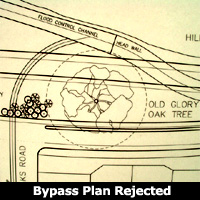 nothing
there. It's not needed. It may never be needed. The two-lane
road that's here right now is completely sufficient for the
development that's here. nothing
there. It's not needed. It may never be needed. The two-lane
road that's here right now is completely sufficient for the
development that's here.
The local developer here doesn't want to expand the road,
he's being forced by the county. If you were to come and see it,
you see that what they're doing is expanding this
road for another quarter mile, and then it just ends. All
there is is a natural canyon back there.
You know, the process is broken because why would they proceed?
this stuff is five to ten years away, if it  even
gets approved. And so to go ahead and take this tree down,
which is such an icon here, particularly now, just doesn't
make sense. If you look at it from that perspective, it makes
sense to keep the tree here, if you worry about even
gets approved. And so to go ahead and take this tree down,
which is such an icon here, particularly now, just doesn't
make sense. If you look at it from that perspective, it makes
sense to keep the tree here, if you worry about  future
(tree-sitting) incidents. I don't know what to say about that.
If you do the right thing, you do the right thing. future
(tree-sitting) incidents. I don't know what to say about that.
If you do the right thing, you do the right thing.
When the system isn't working, citizens need to take action.
If these guys think they are somehow above dealing with the
citizenry and they don't want to deal with community action,
then maybe they should retire and move on to something else,
because they work for the people. That's my perspective on
it. That was their position early, and now through public
pressure they've been forced into a situation where they need
to be in conversation.
See, this is the attitude from these politicians I think
is offensive and 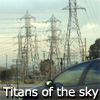 totally
goes against the grain of what democracy should be about.
Mr. Antonovich has not shown his face here. We've invited
him many times he's never come out to see it. totally
goes against the grain of what democracy should be about.
Mr. Antonovich has not shown his face here. We've invited
him many times he's never come out to see it.
The question is, who is he working for? Is he working for
the developers exclusively, or is he representing his constituents?
You look at the history of our country dating
back to the Boston Tea Party and America is about people standing
up. Democracy is an evolving process. It's never finished.
Politicians sometimes get into a position where they think
they don't have to deal with average people  anymore
and they hide behind their bureaucratic rules and say, we're anymore
and they hide behind their bureaucratic rules and say, we're
not going to talk to them because they're not doing it exactly
the way we want them to. I think it's time to shake them up
and get 'em out of office if that's the way they're going
to be. It's time to shake a few branches. Are we living in
a democracy? Or are we living in a 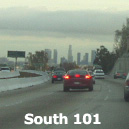 place
where everything is ruled by how much money you have and the
backroom deals you cut? You're getting a little piece of my
mind right now. place
where everything is ruled by how much money you have and the
backroom deals you cut? You're getting a little piece of my
mind right now.
MUSIC
John: Just below here we have
an educational tent and we have live musicians come and play
quite a bit. There have been numerous songs written about
the tree. One rap song that's been produced I know is pretty
amazing. A couple different folk songs have been written and
gotten some
airtime.
Myself, I have eclectic taste. There are a few singers  who
tend to have strong ties to the environment, whether it's
Ani Difranco, Bonnie Raitt, Don Henley certainly, Paul McCartney for that matter. In terms of music, I think good
music is good music. Jackson Brown has a couple great environmental
songs. One I really appreciate is called "I Am A Patriot,"
a brilliant take on what it means to be a true patriot. who
tend to have strong ties to the environment, whether it's
Ani Difranco, Bonnie Raitt, Don Henley certainly, Paul McCartney for that matter. In terms of music, I think good
music is good music. Jackson Brown has a couple great environmental
songs. One I really appreciate is called "I Am A Patriot,"
a brilliant take on what it means to be a true patriot.
MOVIES
John: One of the local women,
a supporter, says her kids think the tree is magical
like something out  of
Harry Potter. It's interesting. What we're talking about here
are things that are mysterious, that are far older than us.
For me, I'm definitely a big Lord of the Rings fan. I would
love to check out the second Rings movie when it comes out
next week. I do think there is a bit of that adventure to
this whole of
Harry Potter. It's interesting. What we're talking about here
are things that are mysterious, that are far older than us.
For me, I'm definitely a big Lord of the Rings fan. I would
love to check out the second Rings movie when it comes out
next week. I do think there is a bit of that adventure to
this whole  experience.
Using the Harry Potter analogy, in some ways I think you've
got some of these politicians who are Muggles. You've got
other folks who see the magic and beauty in something that's
400 years old, that's been here before the pilgrims arrived. experience.
Using the Harry Potter analogy, in some ways I think you've
got some of these politicians who are Muggles. You've got
other folks who see the magic and beauty in something that's
400 years old, that's been here before the pilgrims arrived.
THE LORAX CONNECTION
Five-O: Is "The Lorax"
by Dr. Seuss an inspiration in this?
John: Absolutely. The Lorax
had a huge impact on me. In fact all of Dr. 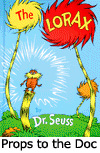 Seuss's
work had a big influence, but particularly The Lorax. One
of the great experiences of my life, I was working in a restaurant
in La Jolla at the time. It must have been around 1980 or
'81, and we had a private party it was Dr. Seuss's
birthday. Our manager came in and said, "Does anyone
want to go in and say good things to Dr. Seuss on his birthday?"
So I went out and I was able to actually kneel down beside
him and tell Dr. Seuss how much his work had meant to me.
It's one of the great moments of Seuss's
work had a big influence, but particularly The Lorax. One
of the great experiences of my life, I was working in a restaurant
in La Jolla at the time. It must have been around 1980 or
'81, and we had a private party it was Dr. Seuss's
birthday. Our manager came in and said, "Does anyone
want to go in and say good things to Dr. Seuss on his birthday?"
So I went out and I was able to actually kneel down beside
him and tell Dr. Seuss how much his work had meant to me.
It's one of the great moments of 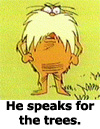 my
life to be able to give a tiny bit back. His body of work
is phenomenal and the impact it had on a whole generation.
He's probably my number one hero. my
life to be able to give a tiny bit back. His body of work
is phenomenal and the impact it had on a whole generation.
He's probably my number one hero.
It's funny, some of the kids here want to make signs that
say, "Don't be a Grinch, Mr. Antonovich."
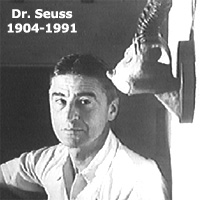
|






























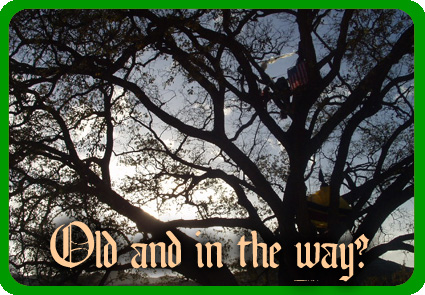
 Quigley
spent 70 days on board the ancient giant to make his point.
But right now, it's the developers who control the tree's
fate. Here's what Quigley had to say one afternoon during
his 70 days out on a limb.
Quigley
spent 70 days on board the ancient giant to make his point.
But right now, it's the developers who control the tree's
fate. Here's what Quigley had to say one afternoon during
his 70 days out on a limb. Physically
the biggest challenge is the lack of aerobic exercise. I go
up and down the rope part of the way in the tree. That gives
me a little bit of exercise but it's not like playing basketball.
The atrophy factor is definitely the biggest challenge.
Physically
the biggest challenge is the lack of aerobic exercise. I go
up and down the rope part of the way in the tree. That gives
me a little bit of exercise but it's not like playing basketball.
The atrophy factor is definitely the biggest challenge.  had
a background in forest protection so I got this email
it was an emergency situation and I just decided to respond
to it. The people up here who were asking for help sent me
an email photograph of the tree and explained the situation,
that it was being cut to widen the road. In this case, email
played a big part.
had
a background in forest protection so I got this email
it was an emergency situation and I just decided to respond
to it. The people up here who were asking for help sent me
an email photograph of the tree and explained the situation,
that it was being cut to widen the road. In this case, email
played a big part. The
sheriff came one morning and said they'd been dispatched because
the tree was going to be cut that morning. A bunch of folks
stood under the tree and the sheriff said they were subject
to arrest if they didn't leave.
The
sheriff came one morning and said they'd been dispatched because
the tree was going to be cut that morning. A bunch of folks
stood under the tree and the sheriff said they were subject
to arrest if they didn't leave.  their
heads and said, "We don't want any part of this,"
so they left. Then the sheriff stood down, and from that point
on things have been moving in our direction, which means reaching
a solution that saves this tree.
their
heads and said, "We don't want any part of this,"
so they left. Then the sheriff stood down, and from that point
on things have been moving in our direction, which means reaching
a solution that saves this tree. public
pressure he said that he was going to move the tree. We think
that moving it would kill the tree and most experts agree.
public
pressure he said that he was going to move the tree. We think
that moving it would kill the tree and most experts agree.
 15th
of November. Once the story changed and they said they were
moving the tree, our whole situation became consulting with experts
in the community, and communicating
to the public that moving the tree would be the same as killing
the tree. It would be an expensive sideshow. We won that battle
in the public mind. Then I had Thanksgiving in the tree. We
had a big celebration out here.
15th
of November. Once the story changed and they said they were
moving the tree, our whole situation became consulting with experts
in the community, and communicating
to the public that moving the tree would be the same as killing
the tree. It would be an expensive sideshow. We won that battle
in the public mind. Then I had Thanksgiving in the tree. We
had a big celebration out here. when
everything changed, because we created such a big presence
out here that very quickly negotiations began.
when
everything changed, because we created such a big presence
out here that very quickly negotiations began.  character
you can describe?
character
you can describe? development
across the street, the line of new homes on the ridge, and
up ahead I see the natural canyon as it used to be.
development
across the street, the line of new homes on the ridge, and
up ahead I see the natural canyon as it used to be. back
in '95. That's where I learned some of these techniques. I've
been involved in various issues, rainforest issues. I also
produce events, educational events for kids and stuff like
that.
back
in '95. That's where I learned some of these techniques. I've
been involved in various issues, rainforest issues. I also
produce events, educational events for kids and stuff like
that. Angeles
and saw the density and pollution and thought, wow, is this
where everything is headed? That was 1989.
Angeles
and saw the density and pollution and thought, wow, is this
where everything is headed? That was 1989. the
tree for Christmas and New Year's?
the
tree for Christmas and New Year's?
 say
too much. I never imagined it would go this long. I just didn't
think it would be that difficult to save a 400 year-old oak
tree it's the oldest in this whole area right here.
say
too much. I never imagined it would go this long. I just didn't
think it would be that difficult to save a 400 year-old oak
tree it's the oldest in this whole area right here. here
and the only one left is the one they called Old Glory. They
named it that because it stands here in all its glory and
majesty representing all the trees that have already been
cut down.
here
and the only one left is the one they called Old Glory. They
named it that because it stands here in all its glory and
majesty representing all the trees that have already been
cut down.  this
letter with the public?" They said they didn't mind,
and that's where Old Glory got its name.
this
letter with the public?" They said they didn't mind,
and that's where Old Glory got its name. nothing
there. It's not needed. It may never be needed. The two-lane
road that's here right now is completely sufficient for the
development that's here.
nothing
there. It's not needed. It may never be needed. The two-lane
road that's here right now is completely sufficient for the
development that's here. even
gets approved. And so to go ahead and take this tree down,
which is such an icon here, particularly now, just doesn't
make sense. If you look at it from that perspective, it makes
sense to keep the tree here, if you worry about
even
gets approved. And so to go ahead and take this tree down,
which is such an icon here, particularly now, just doesn't
make sense. If you look at it from that perspective, it makes
sense to keep the tree here, if you worry about  future
(tree-sitting) incidents. I don't know what to say about that.
If you do the right thing, you do the right thing.
future
(tree-sitting) incidents. I don't know what to say about that.
If you do the right thing, you do the right thing.  totally
goes against the grain of what democracy should be about.
Mr. Antonovich has not shown his face here. We've invited
him many times he's never come out to see it.
totally
goes against the grain of what democracy should be about.
Mr. Antonovich has not shown his face here. We've invited
him many times he's never come out to see it.  anymore
and they hide behind their bureaucratic rules and say, we're
anymore
and they hide behind their bureaucratic rules and say, we're
 place
where everything is ruled by how much money you have and the
backroom deals you cut? You're getting a little piece of my
mind right now.
place
where everything is ruled by how much money you have and the
backroom deals you cut? You're getting a little piece of my
mind right now. who
tend to have strong ties to the environment, whether it's
Ani Difranco, Bonnie Raitt, Don Henley certainly, Paul McCartney for that matter. In terms of music, I think good
music is good music. Jackson Brown has a couple great environmental
songs. One I really appreciate is called "I Am A Patriot,"
a brilliant take on what it means to be a true patriot.
who
tend to have strong ties to the environment, whether it's
Ani Difranco, Bonnie Raitt, Don Henley certainly, Paul McCartney for that matter. In terms of music, I think good
music is good music. Jackson Brown has a couple great environmental
songs. One I really appreciate is called "I Am A Patriot,"
a brilliant take on what it means to be a true patriot. of
Harry Potter. It's interesting. What we're talking about here
are things that are mysterious, that are far older than us.
For me, I'm definitely a big Lord of the Rings fan. I would
love to check out the second Rings movie when it comes out
next week. I do think there is a bit of that adventure to
this whole
of
Harry Potter. It's interesting. What we're talking about here
are things that are mysterious, that are far older than us.
For me, I'm definitely a big Lord of the Rings fan. I would
love to check out the second Rings movie when it comes out
next week. I do think there is a bit of that adventure to
this whole  experience.
Using the Harry Potter analogy, in some ways I think you've
got some of these politicians who are Muggles. You've got
other folks who see the magic and beauty in something that's
400 years old, that's been here before the pilgrims arrived.
experience.
Using the Harry Potter analogy, in some ways I think you've
got some of these politicians who are Muggles. You've got
other folks who see the magic and beauty in something that's
400 years old, that's been here before the pilgrims arrived.
 Seuss's
work had a big influence, but particularly The Lorax. One
of the great experiences of my life, I was working in a restaurant
in La Jolla at the time. It must have been around 1980 or
'81, and we had a private party it was Dr. Seuss's
birthday. Our manager came in and said, "Does anyone
want to go in and say good things to Dr. Seuss on his birthday?"
So I went out and I was able to actually kneel down beside
him and tell Dr. Seuss how much his work had meant to me.
It's one of the great moments of
Seuss's
work had a big influence, but particularly The Lorax. One
of the great experiences of my life, I was working in a restaurant
in La Jolla at the time. It must have been around 1980 or
'81, and we had a private party it was Dr. Seuss's
birthday. Our manager came in and said, "Does anyone
want to go in and say good things to Dr. Seuss on his birthday?"
So I went out and I was able to actually kneel down beside
him and tell Dr. Seuss how much his work had meant to me.
It's one of the great moments of  my
life to be able to give a tiny bit back. His body of work
is phenomenal and the impact it had on a whole generation.
He's probably my number one hero.
my
life to be able to give a tiny bit back. His body of work
is phenomenal and the impact it had on a whole generation.
He's probably my number one hero. 
 massive oak would never survive such a maneuver.
massive oak would never survive such a maneuver. That's
right, Mike Antonovich tried to deregulate Easter, Enron-style,
and throw the spoils to purple-haired figurine Jan Crouch
and the man with the Jesus Ray in his finger, Benny Hinn.
That's
right, Mike Antonovich tried to deregulate Easter, Enron-style,
and throw the spoils to purple-haired figurine Jan Crouch
and the man with the Jesus Ray in his finger, Benny Hinn.
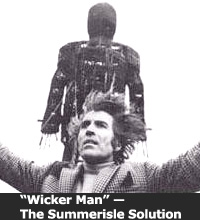 mustache-twirling,
Boss Tweed schemes. Next time you try to help greedy televangelists
steal Easter, or greedy developers kill spirit trees as old
as Shakespeare, you're going to face the fury of publisher
Mick Garrett and Hollywood Five-O.
mustache-twirling,
Boss Tweed schemes. Next time you try to help greedy televangelists
steal Easter, or greedy developers kill spirit trees as old
as Shakespeare, you're going to face the fury of publisher
Mick Garrett and Hollywood Five-O. 